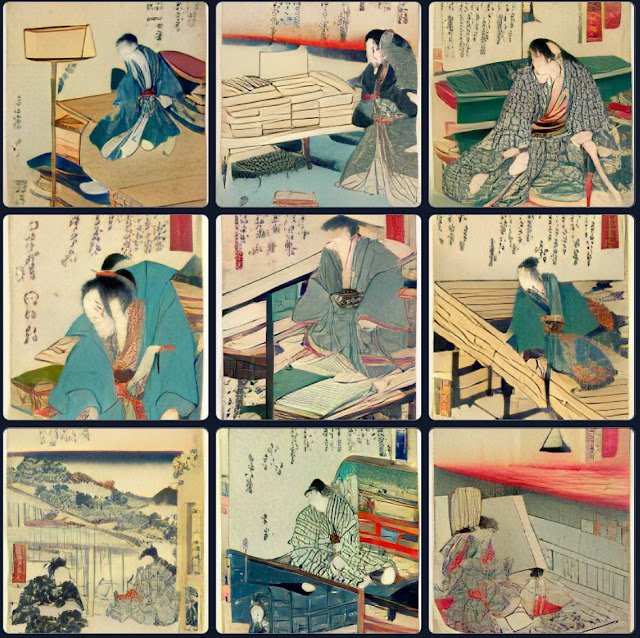 |
Slightly different title in
this latest edition (2013) |
This is a collection of stories by
Nagai Kafu (永井 荷風), the pen-name of Nagai Sokichi (永井 壮吉 - 1879-1959).
In 1905 he was working in New York City for a Japanese bank... and in 1906 he travelled to Paris and London.. Nagai was known for his Chinese poetry. 1905 was the year that my great grandfather was travelling across the USA, then to Japan, China, India... in the opposite direction... and back to London in 1906. They were travelling in opposite directions and probably never met.
The stories from this book were first published elsewhere - the first is from a magazine, Shinshousetsu (
新小説) - and later, the stories were compiled into this book, 'A Strange Tale from East of the River' (or 'Something Strange Across the River' (濹東綺譚, Bokutō Kidan, 1937).
From 'The River Sumida' (すみだ川, Sumidagawa):
"
Taking the lamp in his hand, he went upstairs to Chokichi's room.
There were several books on the desk, and with them a book box of cedar. Ragetsu took out his spectacle case and looked curiously over the textbooks, bound in the Occidental manner. Something dropped to the floor. It was a picture of O-ito, in the festive spring dress of a geisha. Ragetsu put it carefully back into the book from which it had fallen, and went on with his inspection. This time he came upon a letter. It seemed to be unfinished, the last sentence being interrupted where the paper had been torn off. There was enough all the same to make clear what the finished letter would have contained. Chokichi and O-ito had said good-bye, and day by day, as their worlds moved further and further apart, their hearts must also grow apart. They had been friends as children, but they would one day be strangers. Chokichi told in great detail how it grieved him, the knowledge that even if they were to meet from time to time they would no longer share the same feelings. He had therefore decided to be either an actor or a musician, but these wishes, too, had been denied him, and now, helplessly envying the good fortune of Kichi the barber's son, he passed useless, aimless hours. He did not have the courage to kill himself. His one hope was to fall ill and die.
"
Notes... The poet, Matsuo Basho, lived near Sumida River.. His pen-name,
bashou (芭蕉) means banana plant, which grew on the banks of the river.
And
Curlew River - composed by Benjamin Britten - was based on a
Noh play called 'Sumida River', which Britten saw in Japan during his visit in 1956.
Image generated from the text @craiyon:


